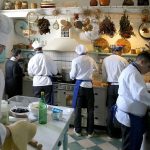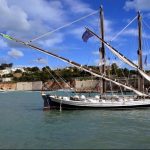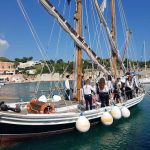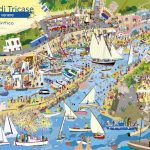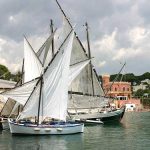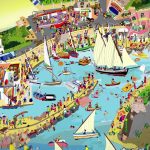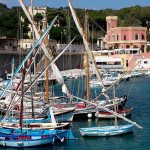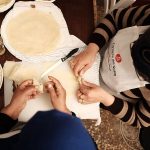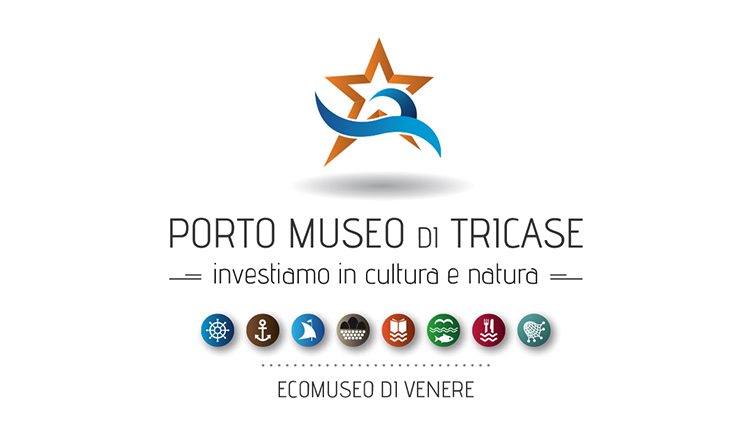
Porto Museo di Tricase
The Permanent Cultural Center on Sea Ancient Traditions
Founded and run by the association Magna Grecia Mare, in partnership with the Town of Tricase, it was inaugurated on 30th April 2006, along with the Museum of Traditional Boats and the School of Lateen Sailing and Ancient Seafaring. It is located in the Casotto of the Port of Tricase, on the South Quay of the Old Port, hosting the legal and operational headquarters of the Ecomuseo di Venere. It is a place devoted to the search, collection, exchange and study of knowledge associated with the traditions of the sea and of the coastal population, a useful growth factor of coastal areas, their activities and their peoples. It is the center of all the cultural initiatives, conferences, seminars, courses, workshops. It is a site for the dissemination of the Mediterranean culture, and for sharing knowledge with prestigious institutions, associations, museums and national and international organizations, with which the Centre has established and continues to tighten fruitful collaboration and exchange. It is the beating heart of the Port-Museum.
The Museum of Sea Art and Traditional Boats
It consists of two parts. The “active” part is represented by the fleet of traditional boats. After being saved from fire or obsolescence, historical fishing boats, varche and schifareddhi, have been carefully restored and returned to the sea and navigation. They are moored in a dedicated space, offering a striking and colorful vision to all visitors who stroll along the quays, and are also available, during the educational paths specially programmed by the School of Ancient Seafaring, to those who would live the thrilling experience of traditional sailing. During the winter season, boats find shelter in the Museum shipyard, where a team of craftsmen, with their antique art, perform the necessary maintenance of the hulls, masts, lateen yards and sails. The “static” part is a welcoming house-museum which predisposes to a charming, educational, recreational and socializing experience, thanks to the direct contact with objects, tools and testimonies of the Mediterranean culture that it contains and offers, in a sublime combination of history and modernity, antique items and modern technologies.
The sailing ship Portus Veneris. It is the flagship of the fleet of the Museum of Traditional Boats and the first emblem of the Port-Museum of Tricase of which it bears the ancient name. Its story is of great symbolic importance: its journey ended in Tricase Porto in May 2002, when 98 Kurdish Iraqi refugees, fleeing from their own country, landed in Italy. It is a type of ship spread throughout the Aegean area, known in Greece as Trechandìri and in Turkey as Tirhandil. Its shapes, simple and linear, meet a constructive model handed down for centuries by the carpenters of the Aegean area. About 100 years old, it is a unique example, being armed with two masts and two lateen sails, plus a series of jibs, according to the oldest tradition. The ship Portus Veneris is a travelling museum, a venue for cultural and institutional events, a training ship where to learn and practice the traditional maneuvers; it is the sailing soil of the Town of Tricase, owner of the ship, a symbol of the historical link with other peoples of the Mediterranean.
The Municipal School of Lateen Sailing and Ancient Seafaring
It is annexed to the Museum of Traditional Boats, and it is aimed at young people and adults who wish to get closer to a real culture of the sea and to a way of life characterized by initiative, adventure, sense of responsibility and passion. It is a school of active training, practice of the sea, ancient techniques of navigation, seamanship, care of the boat, cooking traditions, life of coastal populations. Teaching is structured in modules and each module provides different learning activities (lectures, seminars, workshops, tutorials, guided tours, speeches of witnesses, …) to suit the individual needs of those who want to dive into the world of traditional seafaring. In winter, the School offers pleasant practical and recreational experiences, with carpenters involving all the students, both young and adults, in the works of maintenance of the boats of the museum, or in the faithful reconstruction, and according to ancient techniques, of tools commonly used in the past.
The Rena and The Sette Bocche
The Rena and The Sette Bocche: It is a complex built by the Town of Tricase with the contribution of the Interregional Operational Plan ”Attrattori culturali, naturali e turismo”, and it is located in the oldest part of the Port of Tricase, on the ancient beach and in the old caves used by fishermen and merchants to lead their activities and businesses over the centuries. The complex consists of an Info Point, of a Slow Sea Center and a of a Food-Show-Market center, which respectively: informs guests about the history of the complex and of the whole Port-Museum, as well as about the services offered and the cultural and natural routes organised in the Ecomuseum area; gives room to seminars and meetings of the local community but, above all, to young people, to their organisations and to their cultural, environmental and touristic projects for the development of the area; is devoted to cultural dissemination, to wine tasting, to the promotion and sale of excellent traditional sea and land products, and to the promotion of the culture connected to the lifestyle fostered by these products.
The Media-library of the Sea
As an integral and fundamental part of the Permanent Cultural Center on the Ancient Maritime Traditions has been created the Sea Library. It is an extraordinary tool that allows everyone to read books, consult texts and documents, view photographs and videos, listen to interviews, explore all related issues to the sea and its traditions, drawing directly from the sources of knowledge. The Sea Library collects over 1500 texts on issues related to the Mediterranean, as well as the documentary heritage (photo-video and interviews) collected and catalogued during the field research, on all issues related to the sea and its traditions, all of them computerised through the SEBINA Next library management software and managed and implemented in close collaboration with the Documentation Center of CIHEAM Bari.
MARE - The Mediterranean OUTPOST for monitoring coastal and marine ecosystems
The MARE Outpost, a branch of CIHEAM Bari, has been set up in the framework of Italy-Greece territorial cooperation initiatives. Synergistically integrated into the Port Museum of Tricase, it is a space designed to promote dialogue among Mediterranean coastal communities and between institutions, social and cultural organizations, and citizens’ groups involved in the enhancement and sustainable management of coastal territories. It is an essential tool for the promotion of vocational training and research programmes for the monitoring and protection of biodiversity. It is located in the Otranto Channel, a bio-geographical crossroads with a very high level of biodiversity, including the fauna and flora from the Adriatic, Ionian and Aegean seas. In the framework of numerous international cooperation initiatives, the MARE Outpost receives officials, technicians, operators from third countries to support sustainable development in fragile areas suffering from social and economic difficulties, thereby mitigating the propensity to migrate. All the activities carried out are strongly integrated with the Italian system involving the academia, the Institutions, the private sector and civil society.
The Yard of Taste
It is a place for the research, experimentation, and offering of the ancient and traditional recipes of processing and preservation of sea and land products. It organizes courses and seminars devoted to students of hotel schools, to cultural associations attentive to the traditional gastronomy, to anyone who wants to live, try and learn secrets and recipes of home cooking, which are always healthy and tasty, and often pleasantly “poor”. It teaches how to process, in the best way, the sea and land products, how to treat and store them, and how to manage, according to tradition, the galley of a ship and the pantry of a house. The indispensable vocabulary to be able to interact with Salento fishermen, fishmongers, farmers, greengrocers and chefs is also taught. Last but not least, in an atmosphere of pleasant conviviality, the typical dishes prepared by our chefs and students can be tasted, during the enjoyable hours of the kitchen experience.
Fisheries and Fishermen
The Port of Tricase is also made by a small fishing community, owning small boats and a few tools, catching fish of little value. Men and women, old and young, are attentive guardians of family traditions, proud of their history and origins. These people are aware that their existence is due to the sea and they entrust their future to the sea. The fishermen of the Port Museum of Tricase, together with its community and its social, cultural and economic realities, are an integral part of WEBPORT.CLOUD, the first digital Mediterranean port that, in addition to the Tricase community in Italy, welcomes the coastal communities of Tyre in Lebanon, Marsa Matrouh in Egypt, Zarzis in Tunisia, Algiers in Algeria, Nador in Morocco and Porto Palermo in Albania. It is a place to exhibit and exchange good practices and experiences, listen to the needs of the communities and identify concrete actions, encourage collaborations and development cooperation projects.
Information
Name of the Ecomuseum: Porto Museo di Tricase
Geographical location: Italy, Puglia region, province of Lecce
Year of establishment: 2017
Network: Apulian ecomuseum system
Website: www.portomuseotricase.org

